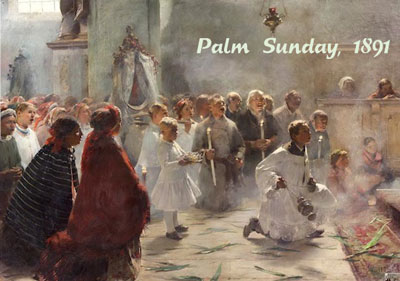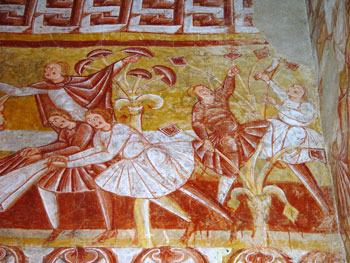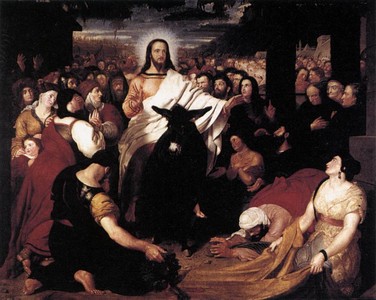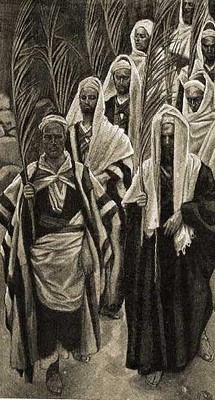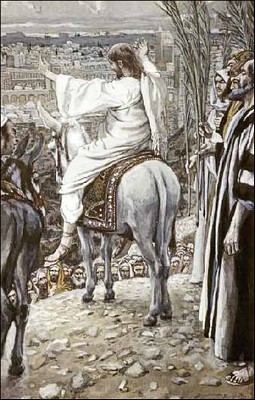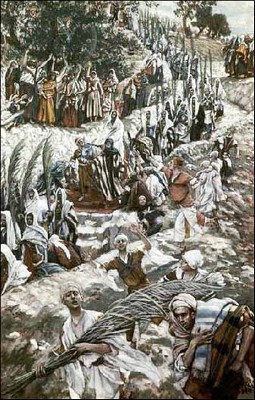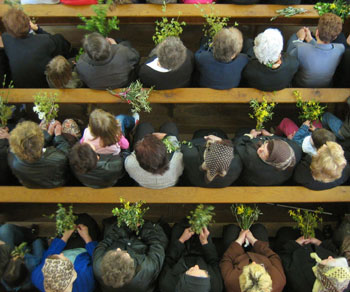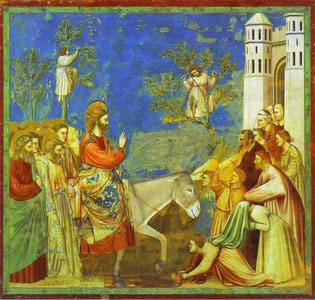
The biblical story of Palm Sunday is recorded in all four of the Gospels (Matthew 21:1-11; Mark 11:1-10; Luke 19:28-38; and John 12:12-18). Five days before the Passover, Jesus came from Bethany to Jerusalem. Having sent two of His disciples to bring Him a colt of a donkey, Jesus sat upon it and entered the city.
People had gathered in Jerusalem for the Passover, the most sacred week of the Jewish Year and were looking for Jesus, both because of His great works and teaching and because they had heard of the miracle of the resurrection of Lazarus. When they heard that Christ was entering the city, they went out to meet Him with palm branches, laying their garments on the ground before Him, and shouting, “Hosanna! Blessed is he that comes in the Name of the Lord, the King of Israel!”
From the east, Jesus rode a donkey down the Mount of Olives, cheered by his followers. He rides the colt to the city surrounded by a crowd of enthusiastic followers and sympathizers, who spread their cloaks, strew leafy branches on the road, and shout, “Hosanna! Blessed is the one who comes in the name of the Lord! Blessed is the coming kingdom of our ancestor David! Hosanna in the highest heaven!”
Jesus was from the peasant village of Nazareth, his message was about the kingdom of God, and his followers came from the peasant class. They had journeyed to Jerusalem from Galilee, about a hundred miles to the north, a journey that is the central section and the central dynamic of Mark’s gospel. Mark’s story of Jesus and the kingdom of God has been aiming for Jerusalem, pointing toward Jerusalem. It has now arrived. On the opposite side of the city, from the west, Pontius Pilate, the Roman governor of Idumea, Judea, and Samaria, entered Jerusalem at the head of a column of imperial cavalry and soldiers
At the outset of His public ministry Jesus proclaimed the kingdom of God and announced that the powers of the age to come were already active in the present age (Luke 7:18-22, Mark 1:14-15). His words and mighty works were performed “to produce repentance as the response to His call, a call to an inward change of mind and heart which would result in concrete changes in one’s life, a call to follow Him and accept His messianic destiny. The triumphant entry of Jesus into Jerusalem is a messianic event, through which His divine authority was declared.
Mark concludes his advance summary of Jesus’s message with, “Repent, and believe in the good news” (1:15).
The word “repent” has two meanings here, both quite different from the later Christian meaning of contrition for sin. From the Hebrew Bible, it has the meaning of “to return,” especially “to return from exile,” an image also associated with “way,” “path,” and “journey.” To believe in the good news,” as Mark puts it, means to trust in the news that the kingdom of God is near and to commit to that kingdom. And to whom did Jesus direct his message about the kingdom of God and the “way”? Primarily peasants
In Mark (and the other gospels), Jesus never goes to a city (except Jerusalem, of course). Though the first half of Mark is set in Galilee, Mark does not report that Jesus went to its largest cities, Sepphoris and Tiberias, even though the first is only four miles from Nazareth and the second is on the shore of the Sea of Galilee, the area of most of Jesus’s activity. Instead, Jesus speaks in the countryside and in small towns like Capernaum. Why? The most compelling answer is that Jesus saw his message as to and for peasants
Jerusalem becomes central in the section of Mark that tells the story of Jesus’s journey from Galilee to Jerusalem. It begins roughly halfway through Mark with Peter’s affirmation that Jesus is the Messiah. The next two and a half chapters, leading to Jesus’s entry into Jerusalem on Palm Sunday, are about what it means to follow Jesus, to be a genuine disciple. Mark develops this theme by weaving together several subthemes:
• Following Jesus means following him on the way.
• The way leads to Jerusalem.
• Jerusalem is the place of confrontation with the authorities.
Jerusalem is the. place of death and resurrection
Commonly called the “first prediction of the passion,” it is followed by two more solemn announcements anticipating Jesus’s execution that structure this part.
Each of these anticipations of Jesus’s execution is followed by teaching about what it means to follow Jesus.
3 meanings of Palm Sunday
1. Palm Sunday summons us to behold our king: the Word of God made flesh. We are called to behold Him not simply as the One who came to us once riding on a colt, but as the One who is always present in His Church, coming ceaselessly to us in power and glory at every Eucharist, in every prayer and sacrament, and in every act of love, kindness and mercy. He comes to free us from all our fears and insecurities, “to take solemn possession of our soul, and to be enthroned in our heart,” as someone has said. He comes not only to deliver us from our deaths by His death and Resurrection, but also to make us capable of attaining the most perfect fellowship or union with Him. He is the King, who liberates us from the darkness of sin and the bondage of death. Palm Sunday summons us to behold our King: the vanquisher of death and the giver of life.
In the gospels, the movements of both John the Baptist and Jesus had an anti-temple dimension. John’s baptism was for the “forgiveness of sins.” But forgiveness was a function that temple theology claimed for itself, mediated by sacrifice in the temple. Like John, Jesus pronounced forgiveness apart from temple sacrifice. It is implicit in much of his activity, including his eating with “tax collectors and sinners,” who were seen as intrinsically impure, but it becomes explicit as well
Thus in these voices from the time of Jesus, Jerusalem with its temple was still seen as “the city of God” that called forth Jewish devotion. But it was also the center of a local domination system, the center of the ruling class, the center of great wealth, and the center of collaboration with Rome.
2. Palm Sunday summons us to accept both the rule and the kingdom of God as the goal and content of our Christian life.
In Mark, Jesus’s message is not about himself-—not about his identity as the Messiah, the Son of God, the Lamb of God, the Light of the World, or any of the other exalted terms familiar to Christians. Of course, Mark affirms that Jesus is both the Messiah and the Son of God; he tells us so in the opening verse of the gospel: “The beginning of the good news of Jesus Christ, the Son of God.”
But this is not part of Jesus’s own message. He neither proclaims nor teaches this, nor does this form part of his followers’ teaching during his lifetime. Rather, in Mark only voices from the Spirit world speak of Jesus’s special identity. It is about the kingdom
In the first century, “kingdom” was a political term. Jesus’s hearers (and Mark’s community) knew of and lived under kingdoms: the kingdoms of Herod and his sons, the kingdom of Rome. Jesus could have spoken of the family of God, the community of God, or the people of God, but, according to Mark, he spoke of the kingdom of God. To his hearers, it would have suggested a kingdom very different from the kingdoms they knew, very different from the domination systems that ruled their lives. And Jesus’s message in Mark, is about the already present kingdom of God that is also yet to come in its fullness.
We draw our identity from Christ and His kingdom. The kingdom is Christ – His indescribable power, boundless mercy and incomprehensible abundance given freely to man. The kingdom does not lie at some point or place in the distant future. In the words of the Scripture, the kingdom of God is not only at hand (Matthew 3:2; 4:17), it is within us (Luke 17:21). The kingdom is a present reality as well as a future realization (Matthew 6:10). Theophan the Recluse wrote the following words about the inward rule of Christ the King:
“The Kingdom of God is within us when God reigns in us, when the soul in its depths confesses God as its Master, and is obedient to Him in all its powers. Then God acts within it as master ‘both to will and to do of his good pleasure’ (Philippians 2:13).
The kingdom of God is the life of the Holy Trinity in the world. It is the kingdom of holiness, goodness, truth, beauty, love, peace and joy. These qualities are not works of the human spirit. They proceed from the life of God and reveal God. Christ Himself is the kingdom.
3. Palm Sunday summons us to behold our king – the Suffering Servant. We cannot understand Jesus’ kingship apart from the Passion. Filled with infinite love for the Father and the Holy Spirit, and for creation, in His inexpressible humility Jesus accepted the infinite abasement of the Cross. He bore our griefs and carried our sorrows; He was wounded for our transgressions and made Himself an offering for sin (Isaiah 53). His glorification, which was accomplished by the resurrection and the ascension, was achieved through the Cross.
In the fleeting moments of exuberance that marked Jesus’ triumphal entry into Jerusalem, the world received its King, the king who was on His way to death. His Passion, however, was no morbid desire for martyrdom. Jesus’ purpose was to accomplish the mission for which the Father sent Him.





